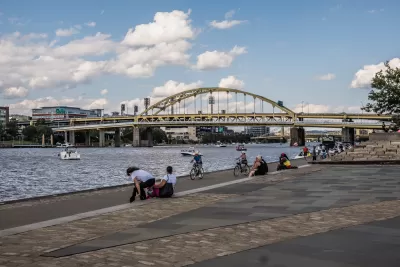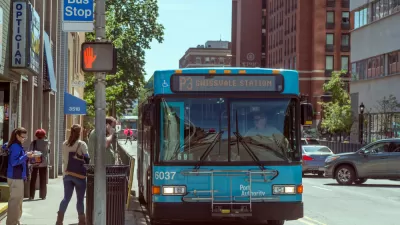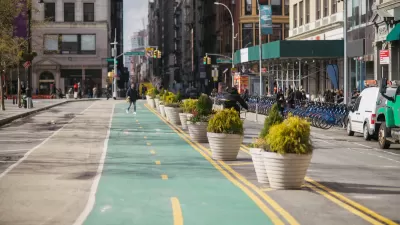A two-year pilot program aims to provide an integrated, multimodal, and affordable transportation system across the city combining transit, bikes, e-scooters, and other options.

Writing in Government Technology, Skip Descant describes the city of Pittsburgh’s Move PGH mobility-as-a-service pilot program, a two-year experiment that focuses on creating an integrated, affordable, and accessible multimodal transportation system.
According to Descant, “Affordable and accessible transportation has become a policy goal at all levels of government, as officials concede it is essential to ensure access to jobs, health care, education and offers a path to upward mobility that lifts people from poverty.” As such, Pittsburgh’s program offers a 30 percent discount on rides taken in geographic “equity areas,” as well as an 80 percent discount for income-qualified residents. “So far, nearly one million trips have been taken on about 1,000 scooters in Pittsburgh, with about 200,000 people signing up to use the Spin scooters. Based on survey data, more than a third of those million trips would have been taken in a car, were the scooters not available.”
As Descant explains, “Move PGH is a pilot which city officials would like to see evolve into a more permanent fixture in Pittsburgh. That will require some action at the state level to allow e-scooters. The devices are allowed to only operate in Pittsburgh, and only as part of the pilot.”
FULL STORY: Pittsburgh Mobility Pilot Builds on Transportation Equity Goals

Study: Maui’s Plan to Convert Vacation Rentals to Long-Term Housing Could Cause Nearly $1 Billion Economic Loss
The plan would reduce visitor accommodation by 25,% resulting in 1,900 jobs lost.

North Texas Transit Leaders Tout Benefits of TOD for Growing Region
At a summit focused on transit-oriented development, policymakers discussed how North Texas’ expanded light rail system can serve as a tool for economic growth.

Why Should We Subsidize Public Transportation?
Many public transit agencies face financial stress due to rising costs, declining fare revenue, and declining subsidies. Transit advocates must provide a strong business case for increasing public transit funding.

How to Make US Trains Faster
Changes to boarding platforms and a switch to electric trains could improve U.S. passenger rail service without the added cost of high-speed rail.

Columbia’s Revitalized ‘Loop’ Is a Hub for Local Entrepreneurs
A focus on small businesses is helping a commercial corridor in Columbia, Missouri thrive.

Invasive Insect Threatens Minnesota’s Ash Forests
The Emerald Ash Borer is a rapidly spreading invasive pest threatening Minnesota’s ash trees, and homeowners are encouraged to plant diverse replacement species, avoid moving ash firewood, and monitor for signs of infestation.
Urban Design for Planners 1: Software Tools
This six-course series explores essential urban design concepts using open source software and equips planners with the tools they need to participate fully in the urban design process.
Planning for Universal Design
Learn the tools for implementing Universal Design in planning regulations.
Ascent Environmental
Borough of Carlisle
Institute for Housing and Urban Development Studies (IHS)
City of Grandview
Harvard GSD Executive Education
Toledo-Lucas County Plan Commissions
Salt Lake City
NYU Wagner Graduate School of Public Service





























